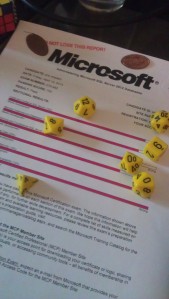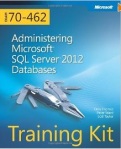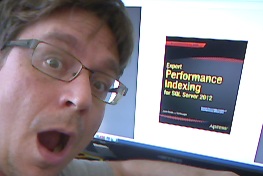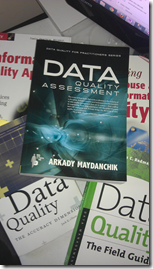Looking back at my list of 30000 foot goals, it seems that I have put forward goals that I will work towards that are hard to measure. A lot of them are more geared toward social aspects that it would feel wrong to measure as such. I think I will attempt to get back into the “Getting things done” methodology a bit more and think about what I want to accomplish, both professionally and at home, on a more regular basis.
With that said, I feel as though I have done a pretty good job at maintaining my goals for family and friends in that I have worked towards a good work / life balance, I have been spending time with family and friends, and I am providing a good home for my wife and child. Some highlights included taking time off when my son was born, taking a trip for our anniversary and getting to see one of our favorite bands in concert, going to a football game with my some friends along with my Dad, Uncle and Cousin, going it to a basketball game with nearly the same group, spending Christmas with both sides of the family.
I have some goals for finances, but they mostly revolve around budgeting, building up savings and not incurring extra debt. I have not done a great job at my stated goals, but I am instead attempting to pay my mortgage off at a faster rate, so I feel like I am doing well here.
As far as health goals are concerned, I have recently been able to reach one of my intermediate goals and am relatively proud of that; now to continue to work towards my long term goals and keep up with exercise. As for getting enough sleep? Well, I am finally starting to catch up – but newborn / infants can make this one a little tough.
For community goals, I have done a few presentations this year, although not as many as I would normally like. I was able to attend the PASS Summit in Charlotte and SQL Saturday Orlando – both were incredible events and I am absolutely grateful to have had the chance to attend. I haven’t been as active with this blog, twitter or really anything else for that matter. It is an area where I plan on improving in 2014 (I’ll believe it when I see it?).
For knowledge, staying current and new things I have attempted to read through various blogs, watch some presentations, attend the local user group and SQL Saturdays, and try new things out. I went to a couple of meetings for the local Big Data group, I listened to an audio book on habits and one on predictive modeling. I have attended training on giving effective feedback and attempted to work more on my soft skills. I managed to pick up the MCSA and MCSE SQL Server 2012 certificates, but I am not nearly as excited about these now that the MCM certification program is closing down.
For fun and activities I have tried to keep up with Game Nights, video games, going to parks, reading and watching movies / shows. In reality, I have probably spent too much time on video games this year. Oh well, even if it wasn’t productive, it was fun.
All in all, 2013 was fantastic. I can only hope that 2014 is as fun, exciting and rewarding.










